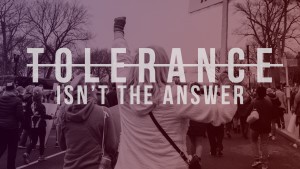
Tolerance. We toss the word around like a bouncy ball in a playground and offer it up as our penance for prejudice, hatred, and violence. Tolerance. We read about it in stylish op-eds and festoon our tweets with its hashtag. Tolerance. We grasp our newfound antidote to narrow-mindedness and accept anything and everything as true.
Tolerance – it’s the perfect fix.
When it comes to reconciling the differences among us, American pastor and theologian Tim Keller accurately sums up what Western thought has so thoroughly embraced: either none of us are right or we all are. So we put up with one another. We view each other through the lens of broad-mindedness and our opposing opinions never come to a head. Sounds peaceful, doesn’t it?
The thing about tolerance, however, is that it’s stagnant. It’s stagnant because you are distant, because you are removed from relationship. There is no understanding without relationship, so there is no growth. And when there is no growth, you die.
To build diverse communities that thrive, that truly reflect the fullness of the Gospel, we must allow our differences to challenge one another.
This seems intimidating, perhaps even wrong. I mean, doesn’t Romans 14:13 say, “Decide instead to live in such a way that you will not cause another believer to stumble and fall?” Although this is biblical truth, the thing is that sometimes our theological differences are actually cultural differences. But the only way to tell is by being in proximity with each another. Through relationship, we create the necessary spaces for understanding to take place, take root and change us. (For more on this topic, see In Close Proximity)
I offer up a personal example. The African American church grasps tightly to the idea of future hope; I grew up hearing this stuff from my grandfather, the esteemed pastor of a historically black church during the time I myself was growing more interested in reformed theology. As a result, I became hardened. I never felt his sermons pointed to the Gospel or exhumed the holy discipline of repentance.
Eventually, through conversations with my grandfather, I was challenged to view this theological distinction as a cultural one. You see, hope is incredibly central to African American churches because for so long, that’s the part of the Bible to which we held. Throughout our tumultuous societal circumstances, throughout the horrors of slavery, segregation, reformation and the Civil Rights movement, black people looked to Jesus as their future hope. He alone could carry them through their suffering. He alone the steady anchor in the midst of momentary pain.
Culture meets church; church reflects culture. And what a wonderful thing that can be.
Now, this is not to say we should accept every single cultural distinction as correct. There are times when people’s beliefs do need to be challenged, when they do need to be rebuked. When we enter into a church community, oftentimes we bring with us specific cultural mindsets that can contradict scripture. To be honest, I have seen way too many people dilute the biblical standards of holiness to accommodate their lifestyles. The justifications for complacency are as varied as they are many, I’m sad to say.
But when these cases arise, and they will, relationship is the currency exchange that allows us to challenge one another. Relationship, not tolerance, is what infuses understanding. It’s what fosters growth. It’s not a perfect fix, but it’s a pretty good place to start.










